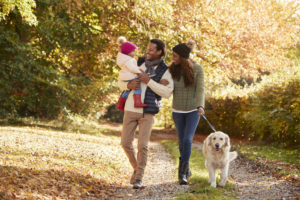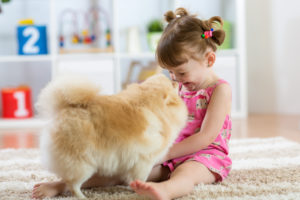
What are the best dogs for babies and toddlers?
So what are the best dogs for babies and toddlers? Dogs can make excellent companions, protectors, and playmates for children. Indeed, there are many advantages to raising children with dogs. Some advantages include more play and exercise, better emotional intelligence, healthier immune systems, and responsibility. Children are sponges and will quickly learn how you treat your dog, so be sure that you are setting an exemplary example.
If you have a new baby or a toddler in the house already. Think carefully about whether or not to add a new dog or puppy to mix. How much extra time, money, and energy do you have to devote to a dog? How much space do you have? Do you want to clean up puppy accidents and dirty nappies? Sometimes showing your children how to be responsible means not getting a dog just yet.
If you do determine that you have enough time, finances, and energy to devote to a furry family member, some breeds can be better than others for homes with children. Here are some of the best dogs for babies and toddlers.
The best breeds for active families

These breeds are very friendly and energetic. Before getting one of these breeds you should take into consideration whether you have the time to walk and play with them. The best dogs for active families include Golden Retrievers, Border Collies, Labrador Retrievers, Poodles, Vizlas, and Irish Setters
Dogs for less active families who prefer smaller or medium-sized dogs

Not every family suits a large dog. Smaller dogs are better for those with small backyards. Some of the best small dogs to consider bringing into your family include Dachshunds, Basset Hounds, Beagles, Cocker Spaniels, Bichon Frises, Boston Terriers, Cavalier King Charles Spaniels and Shih Tzus.
It is important to note that while these breeds are better known for enjoying children, each dog is an individual. So, some individual dogs of the above breeds may not get along with children at all. It can be great if a puppy and baby can be raised together, as long as then have positive interactions with one another. We don’t want anyone to get hurt.
A very important thing to train your puppy is bite inhibition. This will help your puppy to bite softer so that the potential of doing damage goes down. Eventually, you will train the puppy not to bite at all. Being able to train bite inhibition is a definite advantage to getting a puppy vs an adult dog with unknown bite inhibition.
On the other hand, you may decide that you want to get an adult dog. Not a bad idea, hopefully, you won’t have to deal with poopy nappies and puppy accidents at the same time. However, be cautious, there is a huge difference between a dog that tolerates babies and a dog that truly enjoys being around them. It’s a good idea to be aware of some basic dog body language, especially calming signals. That way if you spot that your dog is stressed you can remove them from the situation before someone gets hurt.
Whatever breed you choose, be sure to always observe your children and your dog together. Never leave them alone together. Remember they are both dependent on you and neither one “knows better.” It is solely up to you to keep them both safe, happy, and provided for.





